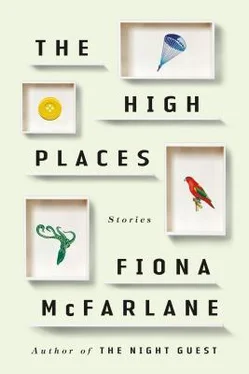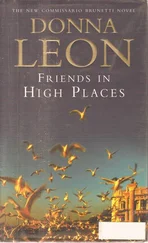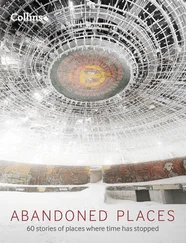Christopher had lived at the St George for three weeks before he met Mr Kidd. If he hadn’t been so wary of his surroundings, they might have met earlier: waiting for the lift, in the lobby, or in the communal bathrooms that dripped with a listless mildew. But Christopher took the stairs rather than the lift, and joined a gym in order to shower there. He walked quickly through the hotel lobby because he was afraid of being caught in conversation with a man like Mr Kidd: a man in a raincoat, a formless man, perpetually sodden, with a hopeful and lonely look, carrying an unredeemable briefcase. Being in the lobby generated a feeling of queasy anticipation, as if some terrible thing might happen at any moment. Christopher passed through at eight every morning on his way to the city library, and he returned just after six. He climbed the stairs and flung the door of his room open wide in case someone was concealing himself behind it. He urinated in his basin so that he might avoid the bathrooms for anything but more substantial needs. The pigeons in the eaves of the St George Hotel filled Christopher’s room with their amorous clatter, and he peered up at them through his scuffed window, most of which had been sacrificed to an air-conditioning unit. He looked at the pigeons with the boredom that comes of a temporary life in an unknown city. Who was this man he’d briefly become? He had no hobbies or preferences or appetites.
This was why Christopher crossed the lobby looking only at his feet. It was why he was so cold to Mr Kidd — in his own politely imperceptible way — at their first meeting.
This meeting took place on a Monday that Christopher had forgotten was a public holiday. It was easy to lose track of these things while living in hotels and libraries; time took on a different, interminable aspect. He set out from the St George at his accustomed hour and discovered, upon arrival, that the library was closed. Something like panic flared in his chest. He was frightened by the thought of the librarians — those helpful, faceless beings who moved quickly through his slow days — relaxing with friends and family in unknown houses all around him. He was unmoored by the locked doors of the library, by the untried city, by his own confusion. At this moment, he longed for the surety of his room at the St George, with its cosy lamp bolted to the bedside table and his pile of scholarly photocopies. But when he returned to the hotel just after nine, his room was full of cleaning materials and the door was half open, although there was no maid to be seen. Christopher placed his backpack on the bed and sat beside it, unsure of what to do. When would the maid return? Would she leave when she saw him? Could he remove her equipment, close the door, and refuse to let her back in? None of these possibilities seemed feasible to him. Instead, he took a pen from his bedside table and the top article from the photocopy pile, stepped over the vacuum cleaner curled dragon-like around a mound of buckets and cloths, and made his way downstairs to the lounge.
The lounge of the St George Hotel was attached to the lobby by a despondent archway wreathed in floral detail. Nevertheless it was a separate room, cut off from the lobby and the lobby’s promise of the street by an atmosphere of lonely sociability. Christopher had only ever been half aware of the movement of unknowable people in its indistinct corners. Now he entered it with purpose, photocopies tucked into his armpit. He noticed a table offering free tea and coffee. This discovery buoyed him; he made himself tea. The room wasn’t empty. Men read papers, they tied their shoelaces on low chairs, they hummed into telephones. All men. The St George had been extending its hospitality to male travellers for eighty years, and its look of faithful resignation suggested that a war was taking place and shortages could be expected. Everything — the discoloured carpet, the honeycomb woodwork — shyly implied the hotel’s former dignity, and the lounge, as a result, retained a gossipy climate in which affable, friendless men flourished. Christopher found a seat and settled there, balancing pen and tea and article. He began to read. He began to relax. The tea was barely warm. Almost immediately Mr Kidd approached him.
‘About time we saw you down here,’ said Mr Kidd. He offered his hand. ‘Bob Kidd. I’m in the room next to yours.’
‘Hello,’ said Christopher, looking up. And then, on seeing the hand and feeling flustered and polite, ‘I’m Christopher.’ He took the hand. The shake was firm, so firm he felt himself rising, just a little, from his chair. Mr Kidd lifted the air behind his trousers as if he were wearing a morning suit and settled into the seat beside Christopher’s. He seemed trim and energetic, youthfully old, with a beard-bordered redness to his face suggestive of whiskey and Sunday walks.
‘Not a bad old place, this,’ said Mr Kidd. ‘Been a regular for twenty years. This your first time?’
Christopher looked at his article as if the answer might be found there.
‘Yes,’ he said.
‘What are you reading up on, then?’
‘It’s research,’ said Christopher. ‘For my thesis.’
‘A thesis, eh? What’s the subject?’
‘History of science.’
‘History!’ declared Mr Kidd. ‘What’s it about, then? In a nutshell.’
‘Oh,’ said Christopher, ‘I don’t want to bore you. It’s very boring. Not to me, of course, but to anyone who isn’t me. Sometimes to me.’ The thought that other people might want to talk with him about his thesis always filled him, against his will, with a grateful excitement.
‘What else am I here for? Go on, bore me.’
‘All right, then. Actually it’s about eighteenth-century medical models. The anatomical models they’d make — of pregnant women, for example, obstetrical models — to teach students and train surgeons. In the eighteenth century.’
‘Oh ho,’ said Mr Kidd, a look of delight on his face. ‘Oh ho,’ he said. ‘I don’t know much about obstetrics, though I’ve seen two children into the world, but I know a little something about models.’ He fixed Christopher with an intimate eye. ‘If you’ve got a minute I could show you quite a model.’
Was this what Christopher had feared, hurrying through the lobby of the St George Hotel, his chin tucked into his nervous collar? An invitation from a man like Mr Kidd, both blatant and disguised, more sad than it was awful? His experiences of seduction had been avid and unvarying; in contrast to this, they took on a new cast of yellow-lit tenderness, as if they had happened long before and were unrepeatable.
‘I’m very busy,’ he said. ‘I’m sorry. So much to read. But thank you.’
Mr Kidd maintained a smile around which the eagerness of his face shrank. He was obviously offended. His invitation had been friendly and too quickly refused. There was a genuine model of some kind — a train, or plane, or a luxury car, a coveted Bugatti convertible that could only ever be owned in miniature.
‘Not to worry. Give me a knock if you ever fancy a chat. Door’s always open.’
Mr Kidd stood abruptly, confused at this failure; there was a collapsing of something, a crowding in of age or exhaustion. His disappointment revealed his years: over eighty. He smoothed down the tails of his invisible suit and persisted with his smile. A keen crowd of old men watched the termination of the exchange from all corners. Christopher worried that he might have humiliated this man in front of his lounge cronies and would now be responsible for a disastrous slip in the social ranks. There was that volatile feeling common to gatherings of this kind on public holidays, suggestive of a public execution.
‘Thank you,’ Christopher bleated to Mr Kidd’s departing figure, which waved a hand about and moved toward the lobby.
Читать дальше












